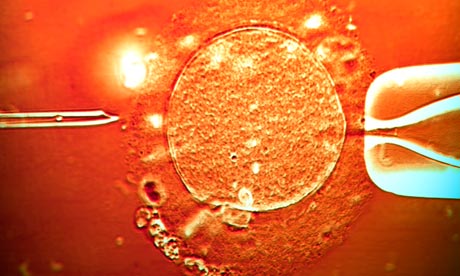
Childless women aged between 40 and 42 will be able to receive IVF on the NHS for the first time under proposals by the treatment regulator to help more people become parents.
Experts welcomed the National Institute for Health and Clinical Excellence's (NICE) planned new policy, which follows the emergence of evidence that IVF can benefit women of that age.
Since 2004 women aged 23 to 39 in England and Wales with an identified cause of infertility, or who have been infertile for at least three years, should have been offered up to three cycles of IVF.
But a squeeze on NHS spending and controversial restrictions mean many have been denied treatment.
Under draft revised guidelines issued by NICE on Tuesday, eligibility for IVF – though only one cycle – will be extended to include women aged 40-42 who are deemed to suffer from "absolute infertility" and have no chance of conceiving by other means.
The regulator conceded, however, its stipulation that such women must not have previously undergone IVF was likely to mean that "quite small" numbers would actually benefit.
"Only a small minority of women aged 40-42 may benefit from the chance to have one cycle of IVF at that age," said Susan Seenan, deputy director of patient group Infertility Network UK .
"It is good to see that the upper age limit for women has been raised as the evidence shows that we can have success with older women, though that should not take away from the clear message that age is still a major factor in fertility and that the longer one waits the greater the likelihood of problems", said Professor Chris Barratt of Dundee University's school of medicine.
NICE also wants to cut the time women aged up to 39 should have been trying to conceive from three to two years. Seenan said that would reduce the frustration felt by childless couples and enable them to access IVF more quickly and thus increase their chances of starting a family.
The new proposals will also rule that only a single embryo should be transferred where possible.
It will also recommend for the first time that doctors can advise HIV-positive male patients that they can have unprotected sex with their female partner in order to conceive as long as the man meets certain criteria, such as being up to date with his antiretroviral medication, and agrees that they only do so when she is ovulating.
Catherine Murphy, head of policy at the Terrence Higgins Trust, welcomed the proposed change. "HIV medications have improved enormously in the last decade, making mother to baby transmission of HIV preventable and ensuring people can live long and healthy lives. It also means that natural conception is now a possibility for HIV positive men and HIV negative women in the right circumstances.
"An HIV diagnosis should no longer be a barrier to parenthood and we are very encouraged that NICE have recognised this in their consultation", she added.

